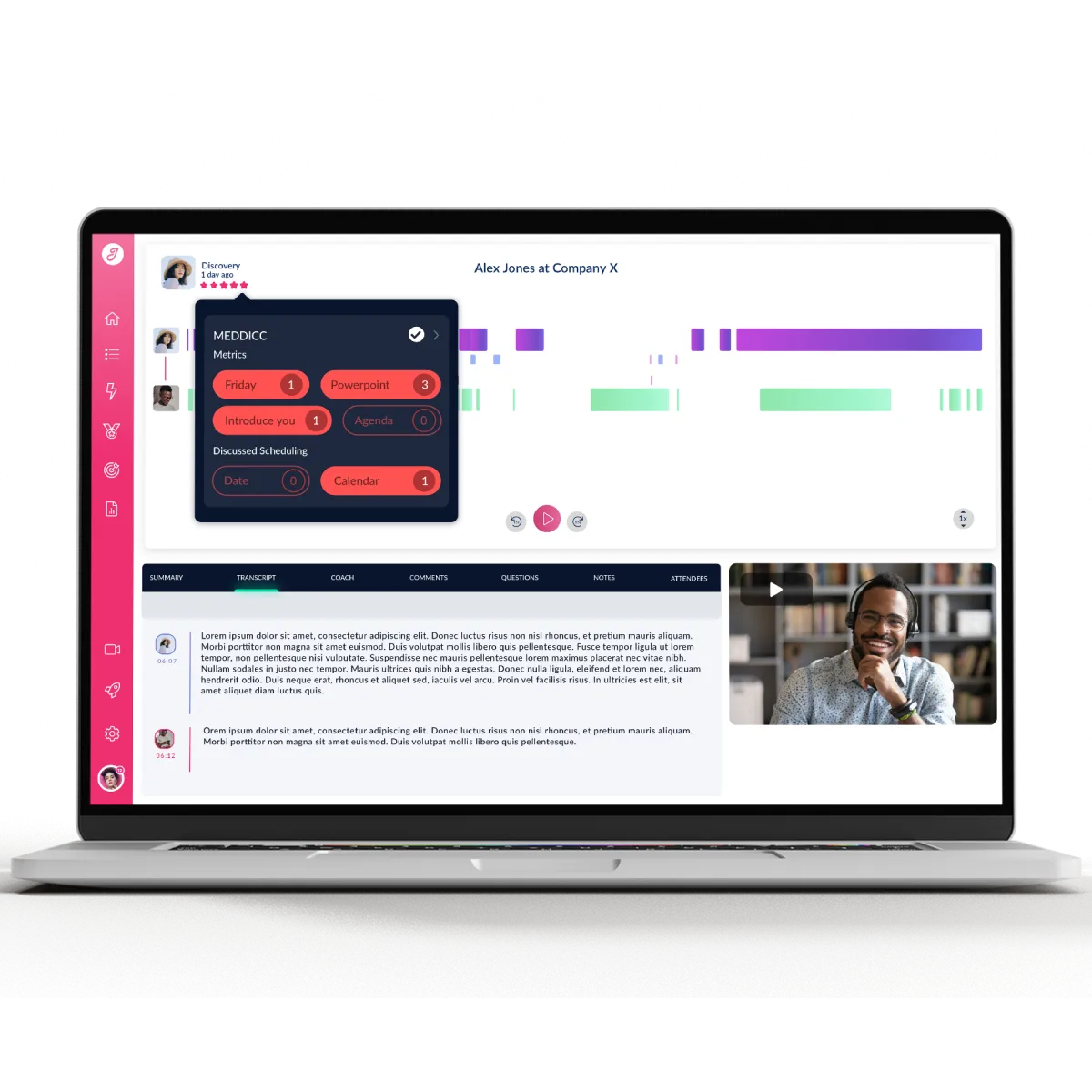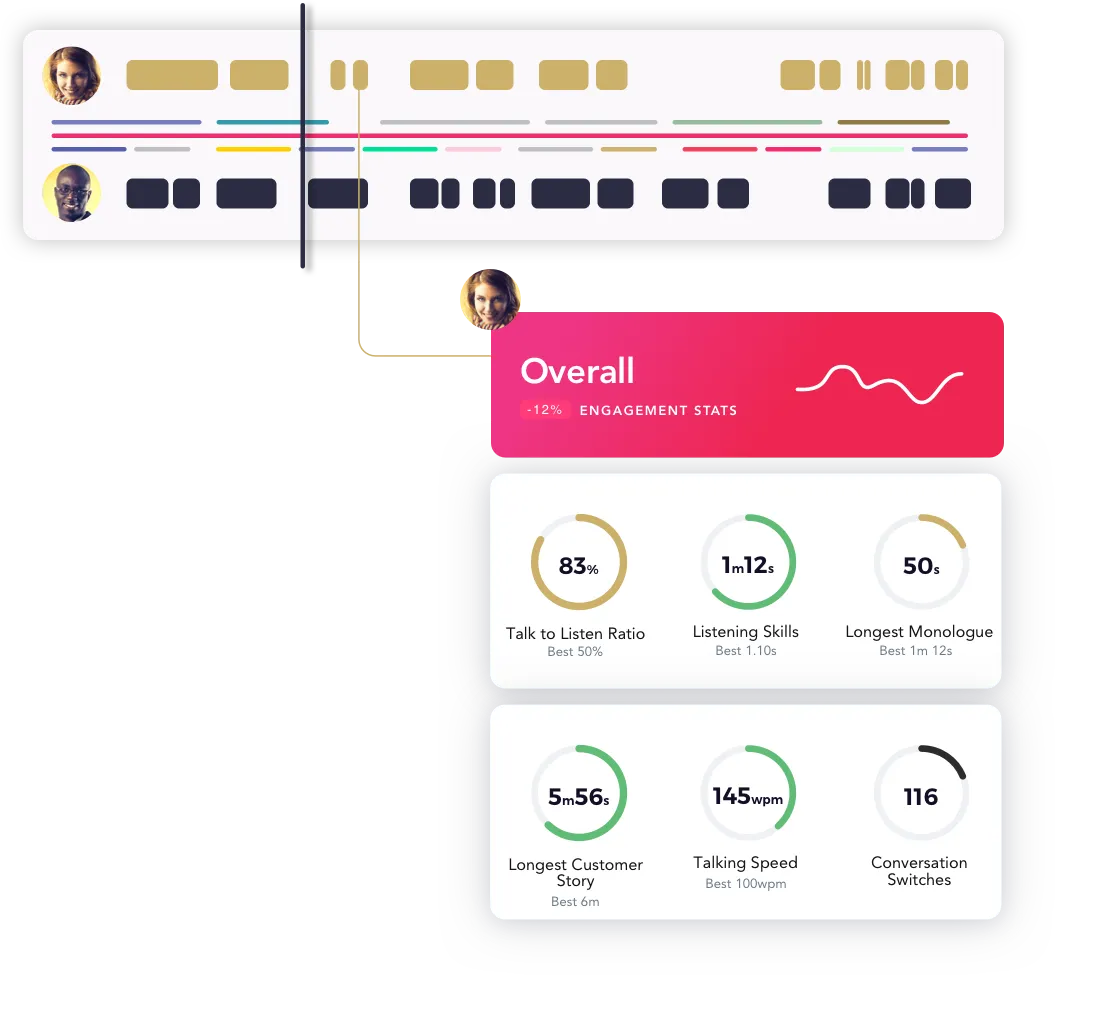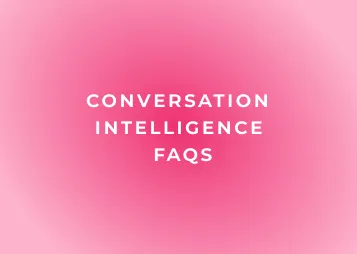If you're new to the world of conversation intelligence platforms, you likely have lots of questions. The market was valued at $1685.4 million in 2022 and is predicted to reach $15545.3 million by 2031, so it’s a growing space with lots of potential for businesses that get in early.
Conversation intelligence (CI) tools record, transcribe and analyze business conversations to provide data-driven insights that can transform your revenue team's performance.
Let's dive into the most frequently asked questions from first-time CI users.
What is conversation intelligence?
Conversation intelligence refers to software platforms that capture and analyze voice and video conversations between your revenue team and prospects or customers. The calls or meetings are recorded, transcribed, and then analyzed using AI and natural language processing to identify things like keywords and topics, customer engagement, competitor mentions, objection handling, and more. This rich data can then be used to coach reps, optimize sales processes, and drive better results.
What revenue results can I expect from using conversation intelligence?
The benefits of conversation intelligence take many forms, here are some of the best:
- Reinforcing your sales methodology across every conversation.
- Reducing rep admin time and accelerating rep ramp time to less than 2 weeks - like Hokodo.
- Identifying great examples to create best practice call libraries.
- Pinpointing areas where reps are struggling to improve rep skills and increasing average order value by 20% - like Cision.
- Optimizing call processes, scripts, collateral, and sales strategies to increase win rates by 15% or shorten sales cycles - like Scoro.
- Real-time visibility into pipeline health and projected bookings.
- Reducing customer churn by identifying churn risks ahead of time - like Lemon.io.
In short, conversation intelligence gives you the data to make smarter, more impactful coaching and strategic decisions.
{% video_player "embed_player" overrideable=False, type='hsvideo2', hide_playlist=True, viral_sharing=False, embed_button=False, autoplay=False, hidden_controls=False, loop=False, muted=False, full_width=False, width='400', height='225', player_id='130216285547', style='' %}
Is it legal to record sales calls?
This is one of the top concerns, and rightly so.
Yes it is legal, you just need to comply with your national or state laws. In most cases you need to notify the customer they are being recorded either verbally or via email and as call recording is increasingly common, this is rarely an issue.
Recording calls requires following specific laws and regulations, each depending on the country you operate in. In the U.S. for example, you must comply with call recording laws which vary by state - some require one-party consent while others mandate all parties must consent. It's critical to understand and follow your state/country's regulations and your CI provider will assist you in complying.
How does the recording and transcription process work?
The mechanics are fairly straightforward - when a rep is on a call or video meeting, either the conversation intelligence platform will join the call automatically as a notetaker or your rep can simply click a button in the software to add the notetaker manually. The recording is then transcribed using speech recognition, with the text transcript synced to the audio/video.

What types of insights do conversation intelligence platforms provide?
The AI and natural language processing can analyze conversations for a wide array of valuable data points:
- Conversation analytics: Product/feature mentions, competitor references, pricing discussions, and other key topics.
- Interaction analysis: Talk ratios, keywords and topics, monologue vs. dialogue, competitor mentions.
- Tone/sentiment analysis: Customer emotions, objections, excitement, confusion, etc.
- Call scoring: Overall rep quality scores based on best practice benchmarks.
- Next step actions: Detected next steps, commitments, and follow-up items.

Reps and managers can then drill down into specific areas of interest across all their team's conversations.
Will reps feel like they're being policed or micromanaged?
This concern is often raised by managers using CI for the first time, but in our experience - managers worry more than reps! It can be largely mitigated by setting the right expectations and goals and having open conversations with your team. Make it clear that CI is meant to be a coaching tool, not a way to nitpick every word. Involve reps in defining what qualifies as a "good" conversation based on your sales methodology. When framed as improving skill sets rather than micromanagement oversight, teams are more receptive.
What is required to implement conversation intelligence?
Conversation intelligence platforms will start capturing conversations right away, but maximizing their value does require some initial setup, which your provider can assist you with. Here are some things we help our customers configure at Jiminny to make sure they get the most out of the platform:
- Integrating with tools like your CRM, video conferencing, and dialers
- Defining your qualitative and quantitative criteria for a successful call
- Creating trackers for keywords and topics, rep milestones, competitor mentions, etc.
- Onboarding reps with training on using the platform
- Establishing cadences for coaching sessions, team meetings, and metric reviews
As you can see, there are many important factors to weigh up when it comes to evaluating and implementing conversation intelligence software. But the visibility, focus areas for improvement, and ultimately increased revenue potential make CI well worth the investment for sales teams.
If you take the time to properly set up the platform and integrate it into your processes, you'll quickly see the powerful impact it can have on your revenue results.
Tom Lavery is the CEO and co-founder of Jiminny, the leading conversation intelligence and sales coaching platform that helps companies maximize their revenue. With over 15 years of experience in high-growth VC/PE-backed SaaS companies, Tom was previously SVP at Reward Gateway, now sharing his wealth of knowledge as a speaker in the conversation intelligence space.





.webp)






